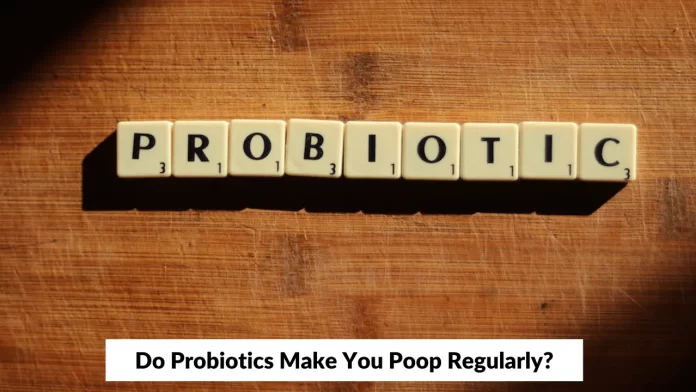Probiotics, the live bacteria and yeasts that are beneficial for our gut health, have gained significant attention for their potential impact on digestive health. Many people wonder if probiotics can actually stimulate bowel movements and relieve constipation. In this article, we will explore the relationship between probiotics and bowel movements, shedding light on whether these beneficial microorganisms can indeed help regulate and improve your digestive system. Get ready to delve into the world of probiotics and their potential effects on your bowel movements.
What are probiotics?
Probiotics are live microorganisms with potential health benefits when ingested or applied topically. These beneficial bacteria can be obtained from fermented foods, dietary supplements, and beauty products. While bacteria are commonly associated with harmful germs, certain types can aid in digestion, combat pathogens, and even synthesize vitamins. Many probiotic strains closely resemble the microorganisms naturally present in our bodies.
Do probiotics make you poop?
Indeed, probiotics have the potential to regulate bowel movements and promote regularity. By enhancing intestinal contractions and improving gut health, they can alleviate constipation and support a more regular pattern of bowel movements.
How does probiotics work?
Probiotics are live microorganisms that are intended to have health benefits when consumed or applied to the body. They can be found in yoghurt and other fermented foods, dietary supplements, and beauty products.
Although people often think of bacteria and other microorganisms as harmful “germs,” many are actually helpful. Some bacteria help digest food, destroy disease-causing cells, or produce vitamins. Many of the microorganisms in probiotic products are the same as or similar to microorganisms that naturally live in our bodies.
You’ve probably heard about many of the benefits of probiotics — from improving your immune function to protecting against infection. But do probiotics make you poop? Probiotics can help improve your digestive health. Depending on the cause of your constipation, they may help relieve it.
Probiotics are the good yeast and bacteria that naturally occur in your body. These good bacteria are balanced with the infection-causing bad bacteria that also live in your body. When you have an overgrowth of bad bacteria, you can develop an infection. Probiotics kill off extra bad bacteria, which helps your body prevent infections.
The probiotics and the bad bacteria that live in your body are part of your microbiome. Your microbiome consists of the trillions of microorganisms that live in your body, both good and bad. Your microbiome is made of the following types of microbes: bacteria, fungi, parasites, and viruses.
Benefits of probiotics
Probiotics offer numerous potential benefits for overall health and well-being. Some of the key advantages of probiotics include:
- Improved Digestive Health
Probiotics help maintain a healthy balance of beneficial bacteria in the gut, supporting optimal digestion and nutrient absorption. They can also aid in relieving digestive issues such as bloating, gas, and diarrhoea.
- Enhanced Immune Function
Certain strains of probiotics have been shown to boost the immune system, helping to defend against infections and reducing the risk of respiratory and gastrointestinal illnesses.
- Management of Irritable Bowel Syndrome (IBS)
Probiotics may help alleviate symptoms of IBS, such as abdominal pain, bloating, and irregular bowel movements, providing relief and improving quality of life for those affected.
- Prevention of Antibiotic-Associated Diarrhoea
Taking probiotics during or after a course of antibiotics can help prevent antibiotic-associated diarrhoea by restoring the natural balance of gut bacteria disrupted by the medication.
- Potential Mental Health Benefits
Emerging research suggests that probiotics may positively influence mental health by modulating the gut-brain axis. They may help reduce symptoms of anxiety, depression, and stress, although further studies are needed to fully understand this connection.
- Maintenance of Vaginal Health
Certain strains of probiotics, such as Lactobacillus, can support vaginal health by preventing the overgrowth of harmful bacteria and yeast, thus reducing the risk of vaginal infections.
- Support for Allergies and Eczema
Probiotics may help regulate the immune response and reduce the risk of allergies and eczema, especially when consumed during pregnancy or early childhood.
What Are Side Effects of Probiotics?
While probiotics are generally safe for most individuals, some people may experience mild side effects. These can include:
- Digestive Issues
In some cases, probiotics may cause gas, bloating, or an increase in bowel movements. These symptoms are typically temporary and subside as your body adjusts to the probiotics.
- Allergic Reactions
Rarely, individuals may have an allergic reaction to specific strains of probiotics. If you experience symptoms such as itching, swelling, or difficulty breathing, discontinue use and seek medical attention.
- Infection Risk
In individuals with weakened immune systems, such as those undergoing chemotherapy or with compromised immune function, there is a small risk of developing infections from certain strains of probiotics. Consult with a healthcare professional if you have a weakened immune system.
- Adverse Reactions in Critically Ill Patients
In rare cases, critically ill individuals, particularly those in intensive care units, may experience complications related to the use of certain probiotics. This is more likely to occur in individuals with severe illnesses or those with medical devices, such as central venous catheters.
Drinks that make you poop immediately?
Natural Drinks To Help Relieve Constipation Instantly:-
- Baking Soda With Water.
- Castor Oil.
- Triphala Drink
- Jaggery (gur) Drink.
- Lemon Juice.
- Apple Juice.
Frequently Ask Questions
Q1: Are probiotics safe?
Ans: Probiotics are generally safe for most individuals.
Q2: Can probiotics cause gas?
Ans: Probiotics may cause temporary gas and bloating in some cases.
Q3: Can probiotics cause diarrhea?
Ans: In rare cases, probiotics may cause temporary diarrhea.
Q4: Should I take probiotics with antibiotics?
Ans: It’s recommended to take probiotics during or after antibiotics to prevent antibiotic-associated diarrhea.
Q5: Can probiotics help with weight loss?
Ans: Some studies suggest a potential link between probiotics and weight management, but more research is needed.




